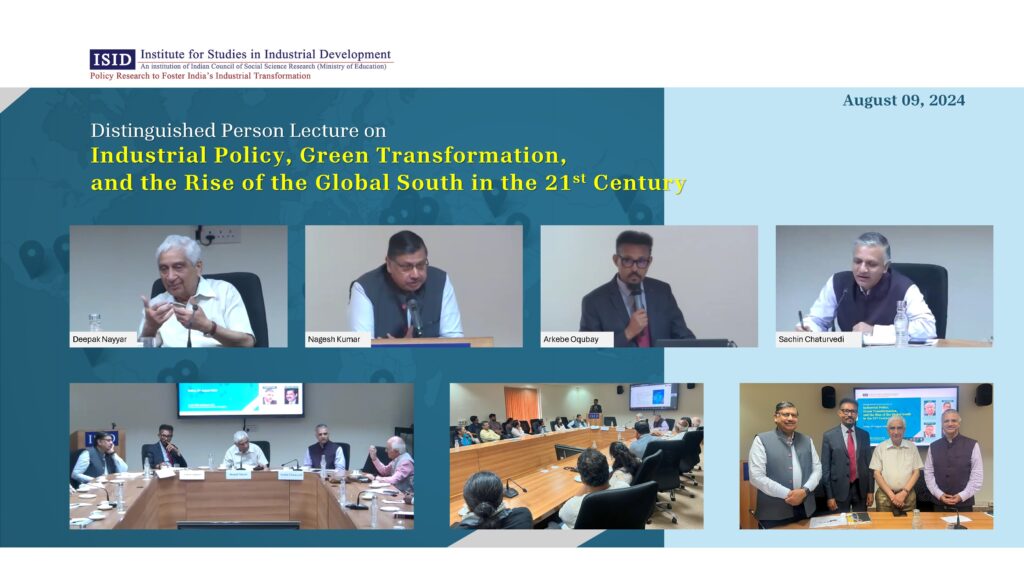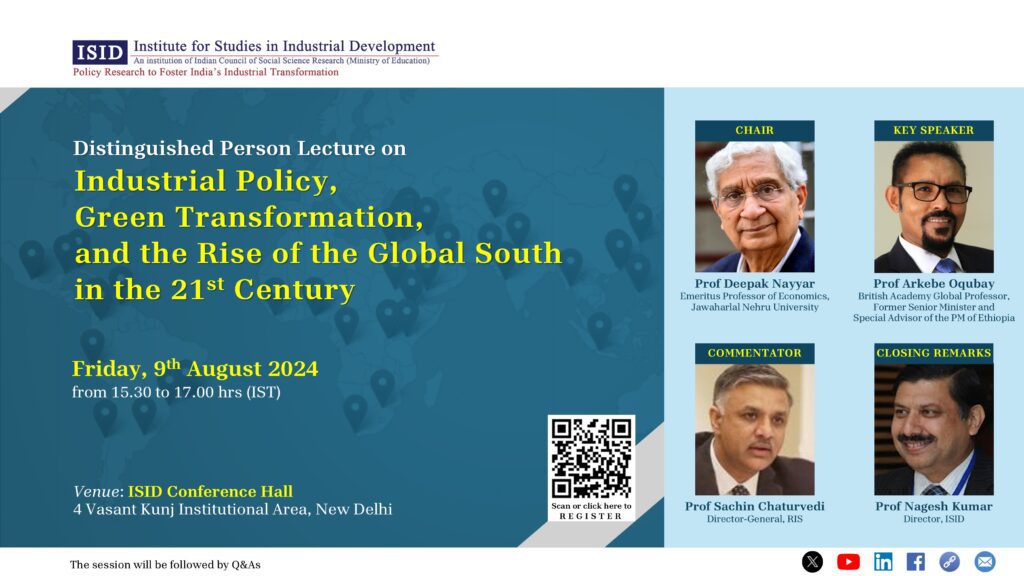Distinguished Person Lecture on Industrial Policy, Green Transformation, and the Rise of the Global South in the 21st Century
 |
| Prof Arkebe Oqubay, British Academy Global Professor at SOAS, University of London, delivered a lecture on “Industrial Policy, Green Transformation, and the Rise of the Global South in the 21st Century” at ISID on August 9, 2024. He emphasised the critical role of industrial policy in both advanced and developing nations, highlighting the challenges posed by the middle-income trap and the urgent need for structural transformation amid the ongoing industrial revolution of the 21st century. Prof Oqubay identified five key drivers—Asia’s rise as engine of global economic growth, Green industrial transformation Growth, Demographic Dynamics and rapid urbanisation, Opportunities for the Global South, and Collective Action—as pathways to navigate this transformation. The session was chaired by Prof Deepak Nayyar, emeritus Professor of economics, Jawaharlal Nehru University (JNU), and Member ISID Board, and featured observations remarks from Prof Sachin Chaturvedi of Research and Information System for Developing Countries (RIS). The lecture concluded with closing remarks from Prof Nagesh Kumar, Director at ISID, who highlighted the importance of collaboration and innovative approaches in shaping the future of industrial policy. The YouTube link to the session is available here. |
 |
| Click here for lecture POSTER |
| Abstract: Industrial policy has increasingly become popular in recent times by advanced economies and developing countries. However, there is less consensus on the nature of industrial policy and the best outcomes in a fundamentally changing global economy, showing vulnerability and volatility. The world has witnessed the most profound crises since 2000 in a hyper-globalised world and significant inequality. After experiencing high economic growth for an episode, many emerging economies face the middle-income trap characterised by inadequate technological innovation and industrial transformation. The world is in the midst of an industrial revolution of the 21st century. The challenge of the middle-income trap in emerging economies has become a significant policy and research agenda. How can developing and emerging economies succeed in effective structural transformation?In this lecture, the speaker presents five leading drivers of the global transformation of our time. First is Asia’s rise as the engine of global economic growth, with the inevitable change in global economic order. Second, beyond the moral imperative of environmental sustainability, green growth and transformation have led to the rise of new industries and innovations in green and digital technologies championed by emerging economies at the heart of the green industrial revolution of the 21st century. Third, demographic dynamics characterised by ageing in advanced economies and population growth in Africa and Asia, accompanied by rapid urbanisation, will shape the concentration of production networks and market growth. Fourth, the Global South has a significant opportunity for economic and technological catch-up by utilising an active industrial policy and industrial transformation, shaping the global economy and international governance system in a new landscape. Finally, the Global South should promote the collective voice, build productive partnerships to accelerate structural transformation, limit their vulnerability, and influence the international governance system. |
| Speaker: Prof Arkebe Oqubay, PhD is a distinguished African thought leader. Currently serving as the British Academy Global Professor at SOAS at the University of London, he is a former Senior Minister and Special Advisor to three successive Prime Ministers of Ethiopia. He has been at the centre of policymaking in Ethiopia for over thirty years, and successfully led bold reforms and played a key role in Ethiopia’s economic transformation at different levels of government. He has been recognised internationally for his innovative and strategic leadership role in Ethiopia’s economic transformation and for championing the country’s pioneering industrial development model, which is being replicated across many African countries. He is the former Mayor of Addis Ababa, recognised for transforming the city. He is the recipient of the Order of the Rising Sun, Gold and Silver Star, bestowed upon him by the Emperor of Japan in recognition of his dedicated contributions to Africa’s industrialisation. He was also Africa’s sole candidate for the Director General of the United Nations Industrial Development Organisation (UNIDO), unanimously endorsed by the African Union. Dr Arkebe was recognized as one of the 100 Most Influential Africans of 2016 and a “leading thinker on Africa’s strategic development” for his work on industrialisation and industrial policies by The New African. His publications include Made in Africa (2015), How Nations Learn (2019), China-Africa and an Economic Transformation (2019); African Economic Development: Evidence, Theory, and Policy (2020); The Oxford Handbook of Industrial Hubs and Economic Development (2020); The Oxford Handbook of Industrial Policy (2020); and the forthcoming The Oxford Handbook on the Greening of Economic Development (2024). |

